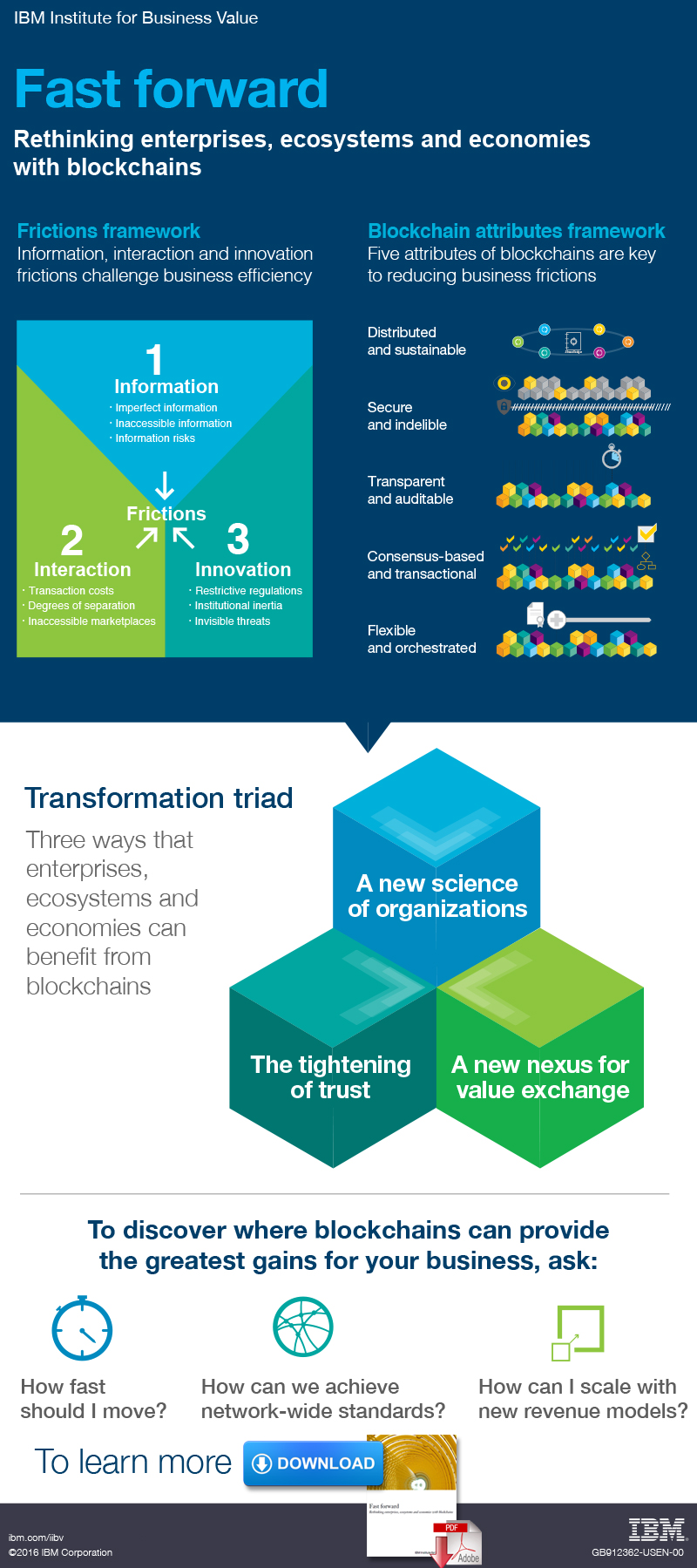Transforming Your Supply Chain Business Networks with Blockchain Technology

Imagine fundamentally changing how business deals are executed - emerging blockchain technology could vaporize roadblocks in all supply chain networks, here's how.
My family is currently experiencing the joy of purchasing a new home.
One of the painful parts of acquiring a new home, however, is the trail of paper and documents that need to be exchanged, signed and validated.
Between mortgage lenders, insurance companies, inspections and government checks, it can be a lengthy process to legally and safely buy our new home.
Each day, people like me, as well as enterprises and governments, buy and trade assets through complex business transactions: from simple deals like purchasing a new car to more complex cross-border trades.
The friction - or inefficiency - of various brokers exists across even simple business networks that take time, incur costs, and increase risk.
Imagine fundamentally changing how business deals are executed by reducing time, cost and risk with blockchains.
A New Reality for Blockchains
At the ‘Blockchain in the Open’ event at the Churchill Club in San Francisco, IBM Institute for Business Value (IBV) announced a new study ‘Fast Forward: Rethinking enterprises, ecosystems and economies with blockchains’ which outlines how this vision will soon become a reality.
The study is the first in a new series examining how blockchains can vaporize frictions to bring new speed, efficiency and transparency to all levels of the business network from enterprises to ecosystems and economies.
In contrast to most business automation today, distributed ledger technologies like blockchains are built on shared ledgers where participants write transactions in near real-time to an unbreakable chain that becomes a permanent record of an asset or transaction.
This is viewable by all parties in the transaction.
In the study, we observe that despite many technology and business innovations, three types of frictions still predominate - lack of access to information, interaction such as transaction costs and innovation including restrictive regulations - and are holding back business growth.
We identified five key attributes of the emerging blockchain technology including how its distributed across the network, yet secure, transparent, consensus-based and flexible - and how these attributes have the potential to vaporize existing frictions and profoundly impact current business models.
Consider how assets from cars to warranties, art to corporate bonds – even identity-based assets, like health or tax records – can be shared, exchanged or transferred on a blockchain platform with far greater efficiency and pose less risk to privacy.
As transaction costs plummet and the way organizations are governed matters more and more, blockchains will create a new distributed form of business governed and managed transparently with digital contracts that include by-laws agreed on by consensus.
Blockchains will also eliminate the need for costly third party institutions or intermediaries to broker trust because smart contracts, certifications and digital compliance will optimize transactional relationships.
Decreasing Friction; Increasing Trust
As blockchains accelerate the flow of capital and the creation of wealth, our economies and interactions will be less subject to the fits and starts of friction, and instead head toward something more like perpetual motion: a state of fast forward.
New services delivered on blockchain networks may accelerate access and liberate those that were once locked out of efficient value creation to fully participate in an “all-in” economy.
These monumental changes may reset the clock on the science of organizational management, the tightening of trust and the economics of wealth creation.
As a result, blockchains will enable profound economic progress enjoyed and driven by a greater number of individuals and organizations.
While blockchains can powerfully improve businesses’ efficiency, trust and value, C-Suite executives must carefully evaluate where blockchains can give them the greatest gains for their business and where they do not.
We recommend in our study that businesses answer these three questions:
- How fast should I move?
- Can we achieve network-wide accepted standards?
- How can I scale with new revenue models?
This cross-industry report is the first in a series by IBM’s IBV over the coming months.
We plan to interview over a thousand executives on their experiences, intentions and expectations about the technology’s impact on their businesses.
About the Author
Veena Pureswaran is Global Research Leader, Blockchain at the IBM Institute for Business Value
Source: Reprinted with permission of Longitudes, the UPS blog devoted to the trends shaping the global economy.
Related Article: Why Blockchain is a Game Changer for Supply Chain Management Transparency

Article Topics
IBM News & Resources
Creating Business Value With Embedded Sustainability The Circular Supply Chain with Lisa Dender, Global Lead for Product Chemical Regulations at IBM Talking Supply Chain Podcast: On the Road at MHI with Noelle Russell Cultivating Relentless Supply Chain Agility at IBM The Retail Supply Chain is Hot Hot Hot The Rebound Podcast: We’re Going to Need a Bigger Boat? New IBM study addresses trucking’s future through a digital transformation More IBMLatest in Supply Chain
Microsoft Unveils New AI Innovations For Warehouses Let’s Spend Five Minutes Talking About ... Malaysia Baltimore Bridge Collapse: Impact on Freight Navigating TIm Cook Says Apple Plans to Increase Investments in Vietnam Amazon Logistics’ Growth Shakes Up Shipping Industry in 2023 Spotlight Startup: Cart.com is Reimagining Logistics Walmart and Swisslog Expand Partnership with New Texas Facility More Supply Chain















